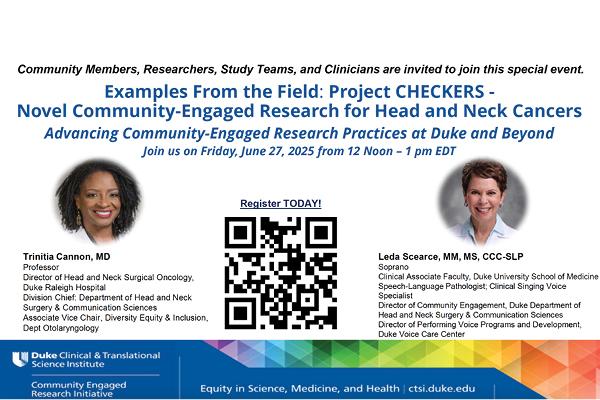
On June 27, the Duke Head and Neck Surgery & Communication Sciences (HNS&CS) team took center stage during a virtual “Examples from the Field” session hosted by the Community Engaged Research Initiative (CERI). These sessions are designed to highlight successful community-academic partnerships and best practices in Community Engaged Research (CEnR).
Representing the department, Dr. Trinitia Cannon, a head and neck surgeon at Duke Health, and Leda Scearce, MM, MS, CCC-SLP, Director of Community Engagement at HNS&CS, presented on Project CHECKERS—an innovative initiative aimed at improving head and neck cancer (HNC) screening and engagement in underserved communities. They were joined by Patrick Warutere and Pauline Mureithi from the North Raleigh International Baptist Church (NRIBC).
Project CHECKERS (Community Head and NEck Cancer Knowledge, Engagement, Research and Screening) is the first HNC screening program at Duke to employ a mixed-methods approach. Under the leadership of Dr. Cannon, the project integrates traditional surveys and screenings with qualitative methods such as interviews and focus groups. This design allows for a more nuanced understanding of community needs, knowledge gaps, and risk perceptions.
According to Co-Principal Investigator Dr. Nosayaba (Nosa) Osazuwa-Peters, the project marks a significant shift in how research engages with communities. “Traditional research is very systematic, very top-down,” he explained. “Researchers often assume they know what the community needs, but they may not understand the community’s values, culture, or lived experiences.” By contrast, Project CHECKERS invites community members to share their stories in their own words—beyond binary survey responses—enabling researchers to ask better questions and design more effective interventions.
The long-term vision of Project CHECKERS is to demonstrate how tailoring HNC screening programs to specific communities can enhance prevention, early detection, and survival rates, particularly among high-risk individuals with limited access to care.
A key example of this community partnership is the collaboration with the NRIBC, which serves a large immigrant population. In 2022, NRIBC Pastor Patrick Warutere invited Duke to participate in the church’s inaugural Health and Dignity for All Fair. Dr. Cannon and Leda Scearce mobilized a team of nurses, medical students, and residents to provide on-site HNC screenings, laying the groundwork for ongoing engagement and trust-building.
Through Project CHECKERS, the HNS&CS team is not only advancing research but also redefining what it means to listen to and serve communities—one conversation, one screening, and one partnership at a time.